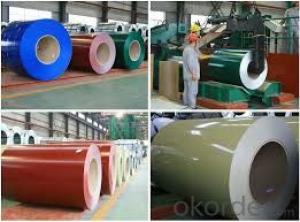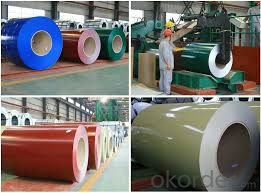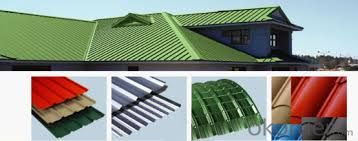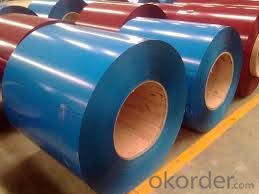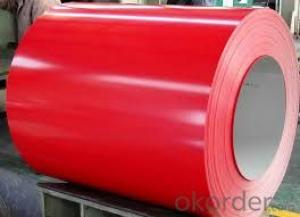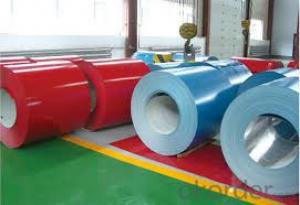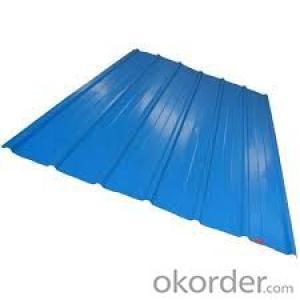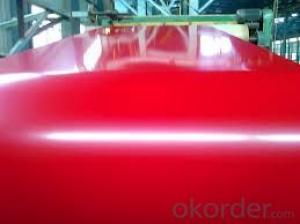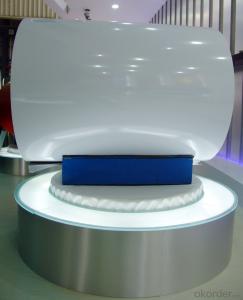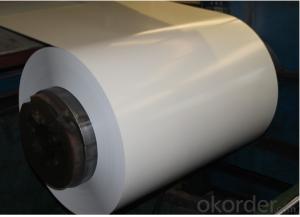Pre-Painted Color Coated Galvanized Steel Coil/China PPGI for Roof Sheet
- Loading Port:
- China main port
- Payment Terms:
- TT OR LC
- Min Order Qty:
- 25 m.t.
- Supply Capability:
- 1000 m.t./month
OKorder Service Pledge
OKorder Financial Service
You Might Also Like
Product Description
Prime CGCC RAL DX51D Z60 Z100 Color Coated Steel/ PPGI/Color Prepainted Galvanized Steel Coil(China)
FOB Price: US $630 - 938 / Ton Get Latest Price
Min. Order Quantity: 15 Ton/Tons
Supply Ability: 5000000 Ton/Tons per year
Port: Qingdao, Tianjin, China
Payment Terms: L/C, T/T, Western Union
Contact Supplier
Company Information
Quick Details
Standard: AISI, ASTM, BS, DIN, GB, JISGrade: SGCC SGCD SGCH DX51D/52D/53DThickness: 0.22-1.0 mm
Place of Origin: Tianjin China (Mainland)Model Number: CGCC CGCL PPGI PPGLType: Steel Coil
Technique: Cold RolledSurface Treatment: CoatedApplication: Container Plate
Special Use: Wear Resistant SteelWidth: 750-1250mmLength: Coil Or Sheet (780-6000 mm ) can be done as your requirements.
Exporting Ability: 500 20ft container/each monthZinc Coating: Z40--Z180g/m2Painting: Front side paint thickness: 15-25μ M (bottom paint + top paint)
Sample: Offer Free Sample For Quality TestContainer Info: One 20ft container can hold 26tons MaxColor: As the RAL color chart
Coil I. D: 508/610 mmCoil Weight: 3.5-8 tons/each coilOther Poducts: Cold rolled, galvanized steel coils
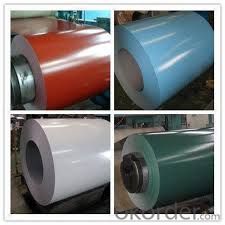
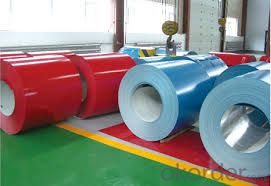
- Q: I'm getting new strings on my dad's old acoustic guitar so I can learn how to play it and I'm wondering if I should get nylon or steel strings. Are there any major differences between the two aside from the nylon strings being easier on your fingers? Like do the Nylon strings sound different?
- Listen to jwent You do NOT want to put steel strings on a nylon string guitar it will pull up the bridge, and top of the guitar, and break the plastic tuners that can't handle the extra tension You can put nylon a steel string guitar, but it won't sound like a classic guitar, because the steel string guitar has the extra bracing, to handle the tension of the steel strings, won't hurt anything, just won't sound as good If you want to soften the feel and sound of a steel string guitar, another option is silk n steel
- Q: What is the average surface finish tolerance for steel coils?
- The average surface finish tolerance for steel coils can vary depending on the specific requirements and applications. However, commonly accepted standards for surface finish tolerance in the steel industry range between 10 to 20 microinches (0.25 to 0.5 micrometers).
- Q: Are steel coils affected by magnetic fields?
- Yes, steel coils can be affected by magnetic fields. Steel is a ferromagnetic material, which means it can be magnetized or attracted to magnets. When a magnetic field is applied to a steel coil, it can induce a magnetic field within the coil, causing the coil to become magnetized. This can have several effects depending on the strength and duration of the magnetic field. If the magnetic field is strong and the coil is exposed to it for a significant amount of time, it can cause the steel coil to retain some magnetism even after the magnetic field is removed. This can be problematic in certain applications where a non-magnetic material is required, as the magnetized steel coil may attract or interfere with other nearby objects. On the other hand, if the magnetic field is rapidly changing or fluctuating, it can induce electrical currents within the steel coil through electromagnetic induction. These induced currents, known as eddy currents, can generate heat within the coil, leading to energy losses and potential damage to the coil. Therefore, it is important to consider the effects of magnetic fields on steel coils in various applications. Protective measures such as shielding or demagnetizing processes may be necessary to minimize the impact of magnetic fields on steel coils when required.
- Q: so i've started learning to play guitar in the past few weeks, and i'm using my sister's old guitar which isn't in very good condition, so i'm planning on buying a new one, but which would be better to buy, nylon string or steel string?
- It rather relies upon on what type of music you're enjoying, nylon string guitars have a mellow, softer tone than steel strings, the feel of the nylon strings (a minimum of to me) are reliable, in my opinion, i might ought to declare nylon is extra suitable, large for finger choosing and a effective tone. once you're searching for a guitar, you are able to flow out to a close-by guitar save, and attempt the two out for your self, in straight forward terms then will you comprehend for specific.
- Q: How are steel coils used in the manufacturing of elevator components?
- Steel coils are used in the manufacturing of elevator components as they provide the raw material for producing various parts such as brackets, frames, and structural supports. These coils are processed through cutting, bending, and shaping techniques to create the necessary components that ensure the safe and efficient operation of elevators.
- Q: What are the different methods of testing the mechanical properties of steel coils?
- Testing the mechanical properties of steel coils can be done through various methods, which play a critical role in determining the steel's strength, ductility, and overall quality. Some commonly employed techniques include the following: 1. Tensile testing: This method involves applying a force to a steel coil until it breaks. It measures the maximum stress the material can endure before fracturing, as well as its elongation and reduction in cross-sectional area. Tensile testing provides valuable information about the coil's ultimate tensile strength, yield strength, and elongation. 2. Hardness testing: This test determines a material's resistance to indentation or scratching. Multiple methods, such as Brinell, Vickers, and Rockwell hardness tests, can be employed to measure the hardness of steel coils. These tests offer insights into the steel's ability to resist deformation and wear. 3. Bend testing: Bend testing involves subjecting a steel coil to controlled bending until it reaches a specific angle or a crack appears. This test evaluates the coil's ductility, flexibility, and its resistance to cracking or fracturing under bending stress. 4. Impact testing: Impact testing gauges a steel coil's capacity to absorb energy when exposed to sudden shocks or impacts. The Charpy impact test is the most commonly used method, wherein a notched specimen is struck by a pendulum hammer, and the energy absorbed during fracture is measured. This test assesses the coil's toughness and resistance to brittle fracture. 5. Fatigue testing: Fatigue testing entails subjecting a steel coil to repeated or cyclic loading to simulate the stresses it may experience during its intended use. This test evaluates the coil's ability to withstand repeated stress over an extended period and its resistance to fatigue failure. 6. Ultrasonic testing: Ultrasonic testing utilizes high-frequency sound waves to detect defects or flaws within the steel coil. This non-destructive testing method can identify internal or surface defects like cracks, voids, or inclusions that may impact the steel's mechanical properties. It is worth noting that these testing methods typically adhere to industry standards and specifications, such as those set by ASTM (American Society for Testing and Materials) or ISO (International Organization for Standardization). This ensures the accuracy and reliability of the results obtained.
- Q: What are the different types of coatings applied to steel coils?
- There are multiple types of coatings that can be applied to steel coils, including galvanized coatings, which involve applying a layer of zinc to prevent corrosion; organic coatings, such as paints or lacquers, which provide protection and enhance aesthetics; and metallic coatings, like aluminum or tin, which offer corrosion resistance and improved appearance.
- Q: I am building a steel type competative team. my team so far isempolem, skarmory , Metagross, magnezone, lucario, ferrothorn.
- If you want steelix is good as he can use fire and steel.
- Q: What are the guidelines for handling damaged steel coils?
- The guidelines for handling damaged steel coils include assessing the extent of the damage, ensuring proper storage conditions, using appropriate lifting equipment, and implementing safety measures to prevent injuries or further damage. It is crucial to follow manufacturer recommendations and consult with experts in the field for specific guidelines based on the type and severity of the damage.
- Q: Are steel coils used in agricultural equipment manufacturing?
- Yes, steel coils are commonly used in agricultural equipment manufacturing. Steel coils are used to create various components such as frames, brackets, and supports, which are essential for the construction and durability of agricultural equipment. The strength and versatility of steel make it a preferred material choice for manufacturing agricultural machinery.
Send your message to us
Pre-Painted Color Coated Galvanized Steel Coil/China PPGI for Roof Sheet
- Loading Port:
- China main port
- Payment Terms:
- TT OR LC
- Min Order Qty:
- 25 m.t.
- Supply Capability:
- 1000 m.t./month
OKorder Service Pledge
OKorder Financial Service
Similar products
Hot products
Hot Searches
Related keywords
